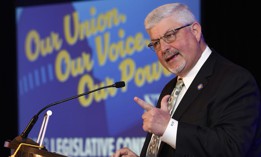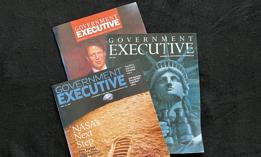While the current administration has provided a surplus of comparisons to Nixon, the two presidents are specifically connected through their persistent campaigns against civil servants and other dedicated professionals within the government who resisted abuses of power by the White House. The Trump family’s public campaign against the federal bureaucracy is a brasher, more public version of Nixon’s efforts to instill loyalty across his administration. Crucially, Nixon’s abuses of power were reined in not only by the public Watergate investigations, but also by high-level Republican appointees who stood up to unethical orders behind the scenes. The moral urgency of protecting government institutions over party is no less great today.
In testimony last week, Yovanovitch, along with George Kent, the deputy assistant secretary of state for European and Eurasian affairs, and Bill Taylor, the top U.S. diplomat in Ukraine, demonstrated the link between patriotism and government service. All of the three made sure to mention that they had proudly served under both Democratic and Republican presidents. Together, they displayed a clear link to the nonpartisan civil servants who collectively prevented Watergate from becoming an even graver constitutional crisis. Before Watergate became a story that dominated the national media in the spring of 1973, there were individuals in within the Office of Management and Budget (OMB) and the IRS that took dramatic steps to block Nixon’s attempts to politicize their work.
As we wait to learn more about the exact role that officials within Trump’s OMB played in his attempt to cut off aid to Ukraine, the public has access to White House records that show that Nixon tried to use the same office to cut federal funds to colleges and universities who adopted a liberal attitude towards antiwar protests. Nixon was particularly determined to deprive the Massachusetts Institute of Technology of tens of millions of dollars of Department of Defense funds for weapons-related research. The president was interested in using MIT as a test case a way to play politics with Pentagon funds and eventually revamp the nation’s liberal education establishment.
The order was initially blocked by a Nixon appointee, George Shultz, when he was the director of the OMB in the spring of 1972. The plan was stopped again in early 1973 when it went before three assistant directors within the office, Kenneth Dam, William Morrill, and Paul H. O’Neill. The trio threatened to resign if they were forced to carry out a request to punish MIT, as they viewed the president’s plan as a clear attack on their office’s work. “I was going to pick up my pen for public consumption,” recalled Morrill, a registered independent who had worked for Democrats and Republicans. O’Neill, a Republican, also remembered resisting the order and his threat to resign. “Congress established eligibility for federal grant funds, and the authority vested in the departments and agencies receive the funds,” he once told an interviewer. “We have no authority in the executive office to overrule it and we’re not going to do it.” The three were supported by Shultz, their former boss, who had moved to the Treasury Department, and the White House backed down from the request. The president’s plan to punish MIT and other elite schools was never carried out, but only because of federal workers who refused to participate in Nixon’s war against the liberal establishment.
Nixon’s obsession with his political opponents also informed his decision to try to weaponize the IRS. After more than two years in office, the president decided to fire his first IRS commissioner, a Georgia Republican named Randolph Thrower, for refusing to use the agency to harass Nixon’s enemies. Thrower was replaced by Johnnie Walters, a Republican from South Carolina who had previously worked for Attorney General John Mitchell at the Justice Department. “He’s Mitchell’s guy and Mitchell vouches for him,” the president’s top domestic adviser, John Ehrlichman, told Nixon in the spring of 1971. During the conversation, Nixon insisted that Walters should “go after our enemies, and not go after our friends! Now it’s as simple as that!” The president added, “We want a lawyer that tells us how to do things, and not that we can’t do things.”
While Walters’ background might have suggested that he would follow Nixon’s orders, his actions as commissioner soon enraged the president. Shortly after his appointment, Walters refused to promote an individual who was known to be a Nixon loyalist. Most notably, Walters also courageously stood up to the White House’s enemies-list project, refusing to initiate audits against hundreds of the president’s opponents in the antiwar and civil-rights movements, the Democratic Party, and the media. With the support of Treasury Secretary George Shultz, Walters successfully blocked Nixon’s order. By the fall of 1972, Nixon was attacking Walters’s masculinity and insisting that his administration be able to target its enemies “even if we’ve got to kick Walters’ ass out first and get a man in there,” as Nixon fumed to his Chief of Staff H. R. Haldeman. He then exclaimed, “He's finished! He's finished!”
Walters resigned in 1973 and spent the rest of his life as a private attorney in South Carolina. “My philosophy was and still is that the IRS is the very basis of our form of government … By doing the job right, we were protecting our tax system and the tax laws and the taxpayers, and not the Administration, necessarily,” Walters remembered years later. Much like the assistant OMB directors who stopped Nixon’s plan to politicize federal funds, Walters valued a nonpartisan approach to his work over his loyalty to the president.
Watergate was in many ways the culmination of Nixon’s battles with the federal bureaucracy, as his determination to find ways to use the levers of government against his enemies led to his downfall.
Today’s political climate is significantly different from the Watergate era, not least because the modern Republican Party is much more hostile toward individuals who break with the president. Nevertheless, last week’s testimonies suggest we are living through similar times, and courageous government bureaucrats still provide an essential roadblock to an authoritarian president.












